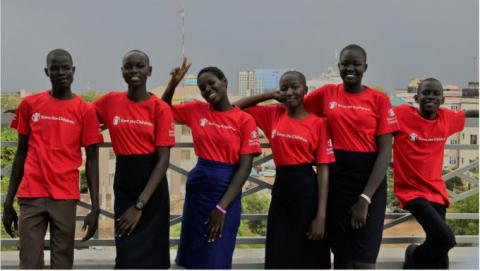World Children’s Day: Children demand government to prioritize their welfare
On the occasion of International Children’s Day, government officials and stakeholders have been told to re-evaluate their priorities to meet the demands of the children of South Sudan.
Juba South Sudan - Six outspoken children organized by Save the Children engaged in face-to-face exclusive dialogue with the Deputy Governor of Central Equatoria state, State Minister of Gender, Child & Social Welfare, Advisor to the Governor on Gender, and representatives from international organizations, among other policymakers in Juba on Saturday, November 20.
This year’s theme; “For every child, a childhood” - emphasises on the call by children to allow them to live a childhood uninterrupted from child labour, marriage, and recruitment by armed groups. The pupils representing various schools in Juba asked the leaders and donors to priorities issues that matter to their generation to create a better future for all children.
During the face-to-face discussion - in front of fellow children and guests, the four girls and two boys demanded – on behalf of other children – for their non-negotiable rights to education, health, water, shelter, food, protection, among others.
Children in South Sudan face many daily challenges including poor levels of education, limited access to healthcare and vaccinations, high levels of malnutrition, and frequent floods, conflict, and food shortages.
The children presented issues they strongly believe affect children’s growth in South Sudan, including challenges facing quality education in the country.
Elizabeth Aguil, 17, said:
“We – as children – do not get the quality education that we deserve because our teachers are not well-paid. We do not have enough scholastic materials. Girls are the most affected because the government does not protect them enough against early marriage."
18-year-old May Modong touched on the issue of child labor - noting that several children are allowed to work as bus conductors, cattle herders, firewood collectors, and construction workers because of poverty.
Modong said:
“Parents send their children to work in the market because they cannot afford to take care of them. These children don’t go to school and are not protected in the places they work. This is child labor and is against the constitution of South Sudan.
Amoko Ronny, 13, raised concerns over the lack of medical facilities for children in remote areas. He said several children die at an early age due to a lack of vaccines like pneumonia, among others.
In many areas of South Sudan, children have to walk for hours to the nearest health clinic, which is often no more than one room with few drugs and no trained staff.
Meanwhile, Esther Raphael, 16, who spoke on early/forced marriage, questioned the government officials and stakeholders to clearly define the marriageable age in South Sudan. Esther said:
“Our laws are not being implemented, perpetrators of violence against children are not arrested and tried in public. Cases of forced marriages in the villages are not detected and no one is encouraging the girls to report these violations against their rights.”
Sukeji Modi, 15, who was moderating the discussion asked the panelists:
“We know many children in the rural areas have no access to scholastic materials, many children in town are hawking to make money to support their families and many girls do not where to report cases of rape and early marriages…what is the government doing to address these issues which will affect the future of these children?”
Save the Children notes that many children remain vulnerable to recruitment into armed groups, family separation and abduction, sexual and economic exploitation, physical violence and psychological trauma, and in some cases lack necessary and adequate adult care or support.
In response, the Deputy Governor of Central Equatoria state admitted that children across the country are left vulnerable to violence, politics, and tradition. She announced that the state government in collaboration with international partners is working on addressing the challenges of access to better school facilities by constructing classrooms and providing scholastic materials.
Education in South Sudan remains an urgent priority with just 27 percent of the population able to read or write, and less than half of children enrolled in school.
Honorable Sarah Nene Redento said:
“We thank our development partners for always standing with us. As the government of Central Equatoria state, we have a lot of plans to benefit our children, including establishing playgrounds. We want Central Equatoria state to be ahead of education, we want our children to be educated and protected because the future is theirs.”
The face-to-face open discussion offered the children an opportunity to raise matters that they view as helpful in their recovery from years of underdevelopment, and interruptions and learning losses experienced through the coronavirus pandemic.
The World Children’s Day was organized by the Central Equatoria state Ministry of Gender, Child and Social Welfare in collaboration with UNICEF, Save the Children, Plan International, Windle Trust International and Nile Sustainable Development Organization.
It was marked not only to remember the importance of children but also their rights and care for their needs in South Sudan.
To achieve some of the demands of the children, Save the Children is working across eight of the ten states in South Sudan where it offers services such as child protection, child rights governance, education, food security & livelihoods, health & nutrition, and humanitarian response programmes.
Save the Children supports curriculum development at the national level; co-chairs the Education Cluster for Education in Emergencies; constructs classrooms, temporary learning spaces, and WASH facilities including latrines and boreholes in schools; supports centers for Early Childhood Development; and trains teachers, Parents Teachers Associations, Social Advocacy Teams, and Local Education Authorities, including headteachers, inspectors, and supervisors.
Written by Daniel Danis/Save the Children
 South Sudan
South Sudan 